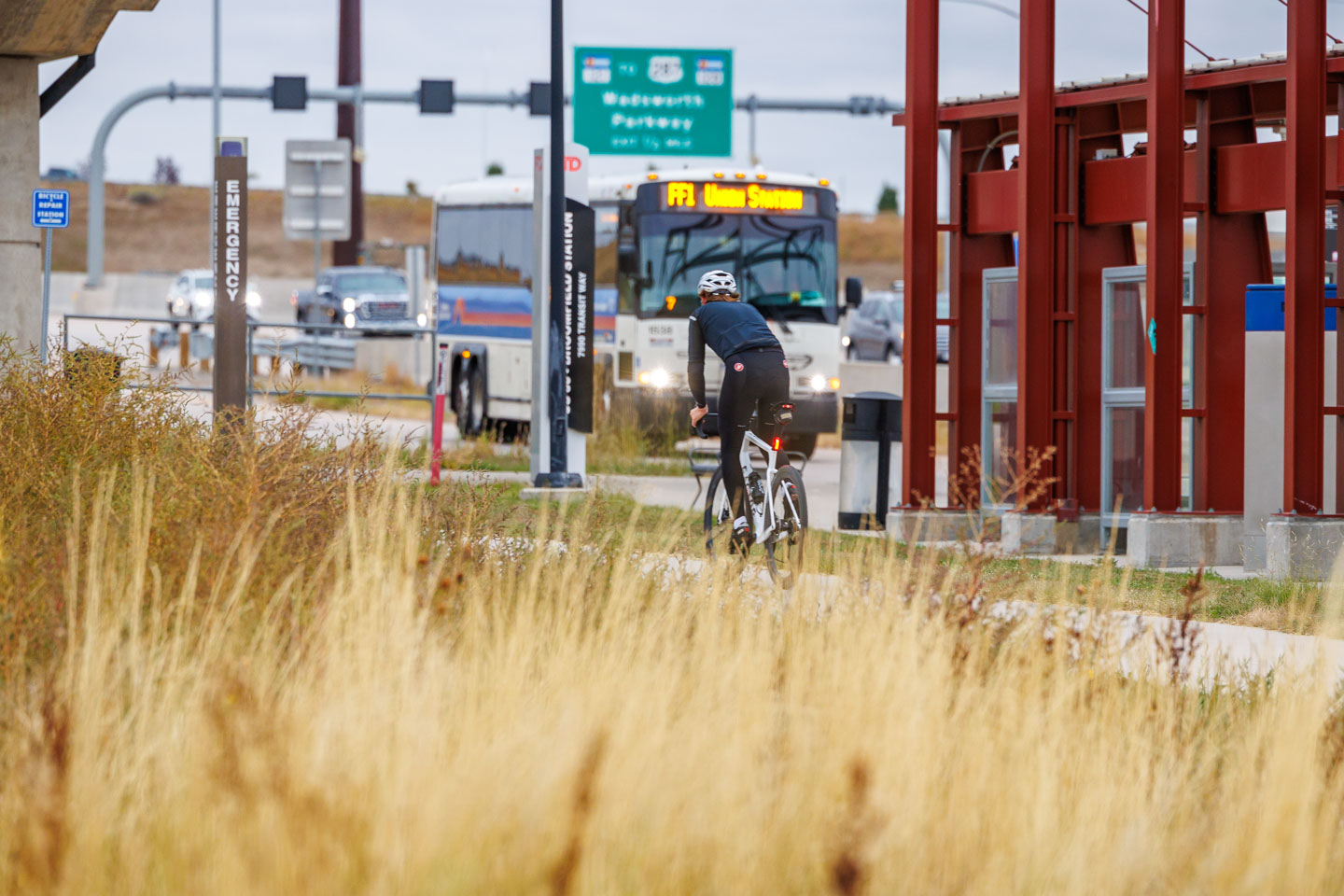
Clean Air
At a Glance
Biodiesel and Low-sulfur Diesel
RTD remains an industry leader with the use of alternative fuels and pollution reduction technology. RTD’s fleet operates on ultra-low sulfur diesel fuel (which contains 95 percent less sulfur) and compressed natural gas. Sulfur produces particulate emissions and the use of ultra-low sulfur diesel fuel results in noticeable reductions in particulate matter (PM) emissions.
Compressed Natural Gas
More than 20 years ago, RTD began experimenting with alternative fuels including methanol, propane and compressed natural gas (CNG) in the daily operation of our standard passenger buses and support vehicles. From 2000 to 2018, RTD utlized 36 buses to provide the Free MallRide service that operated on CNG in an electric-hybrid configuration, and to support these buses, a CNG fueling station was located at the RTD District Shops facility. Starting in 2018, service provision on the Free MallRide was transitioned to a fully electric fleet of buses.
Electric Hybrids
RTD is one of the pioneers in the use of true electric-hybrid buses on the 16th Street Mall. These mall buses take advantage of the latest advanced technology in electric-hybrid propulsion systems. They use a combination of conventional internal combustion engines powered by CNG and electric motors. A small Ford 2.5 liter engine drives a generator which in turn charges a set of batteries. These batteries provide electrical power to propel two electric motors that drive the rear wheels. Each bus can carry up to 115 passengers under the horsepower produced by an engine that is as small as the engine in the popular Toyota Prius hybrid passenger car. The mall buses are quiet and have very low exhaust emission. This fleet of electric-hybrid buses is one of the most successful in the country with RTD receiving recognition through an award from the U.S. Department of Energy’s National Renewable Energy Laboratory (NREL) for leadership in promoting renewable energy and energy efficiency.
Next Generation Electric Hybrids
RTD is currently testing a new generation of hybrid electric mall buses, and is running two prototype buses powered by an all-electric drive train using lithium ion batteries for energy storage. The batteries are used to power the electric motors, and all accessories such as air conditioner, power steering, lighting, etc. The batteries recover kinetic energy from the bus brakes via regenerative braking to extend range, and are recharged by a 30kW micro-turbine. The turbine shuts down when the battery charge is sufficient for operation. The buses can run on all drive operation for most of the day and the buses can be plugged in at night for recharging.
To further advance the use of hybrid technology, RTD now operates nine hybrid intercity buses equipped with a progressive parallel hybrid system designed and produced by General Motors. These buses are driven by both a small diesel engine typically found in a pickup truck and electric motor integrated in a transmission component. The hybrid buses are showing about a 15 to 30 percent improvement in fuel consumption compared to conventional diesel buses.
Intelligent Transmission Shifting
To reduce fuel consumption, RTD has worked with bus transmission manufacturers to implement an intelligent transmission shifting computer program in its buses to take advantage of the increased computer power of the transmission electronic controllers. RTD has programmed the transmissions to select shifting points based on terrain (flat or steep roads), bus loads, acceleration power available from the engine, and road surface resistance. The intelligent program automatically selects the most fuel efficient shift pattern according to road conditions to achieve a fuel savings of approximately 5 to 10 percent as seen in RTD operating conditions. The implementation of this intelligent shift feature has resulted in a reduction of fleet energy consumption, green house and other gas emissions.
Replacement of High-emission Buses
RTD continues to phase out the use of old high-emission buses as an additional effort to minimize vehicle emissions. More than 500 old buses are in the process of being replaced with new, near-zero emission buses. In 2014, RTD began running more than 200 new buses powered by clean burning engines that are equipped with highly advanced emission reduction devices and certified to meet the most stringent EPA emission regulations. These new buses reduce exhaust emissions as much as 90 percent when compared to some of the old high-emission buses that were replaced.
ReFUEL Research Laboratory
RTD’s District Shops facility houses one of the premier engine and fuel research laboratories in the nation, the Renewable Fuels and Lubricants Research Laboratory (ReFUEL). The laboratory is operated by NREL.
Many of RTD’s alternative fueled test buses were thoroughly tested by the laboratory for exhaust emission reduction compared to regular diesel buses. RTD maintains high exhaust emissions standards of two times more stringent than the requirements by the State of Colorado. If a bus fails an emissions test, it is removed from service immediately to remedy the problem. To ensure RTD buses are the cleanest in the state, RTD maintains one of the largest diesel fleet self-certification stations in Colorado.